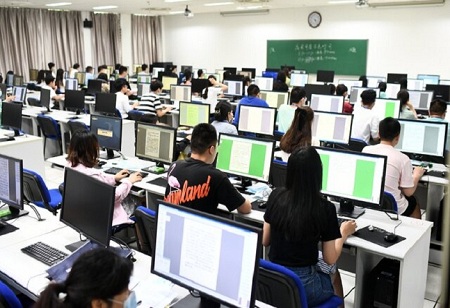-
The new generation of information technology, represented by artificial intelligence (AI), big data, and cloud computing, has brought new opportunities and challenges for the future development of higher education, said Gong Qihuang, president of Peking University, at the World University Presidents Forum held recently in Beijing.More than 500 participants from 36 countries and regions attended the forum, and 65 presidents from high-level universities delivered speeches on topics such as the digitalization of education, future required competence for talents, challenges and innovation of sustainable development of universities, and university cooperation and exchanges.
Digital transformation has brought new vitality to university innovation and development, triggering a reshaping of higher education.He said new technologies diversify teaching, and the traditional knowledge transfer mode centered on teachers, textbooks, and classrooms has been transformed into an ability-cultivation mode centered on students' activities based on many different learning resources.Digitalization will bring unlimited potential and new vision to higher education, which will change the organizational structure, factor relations, functional utility, cultural form, and value proposition of higher education, and form a new form of higher education that is more open, more integrated, and more resilient, said Xia Lixin, secretary of the Party committee of Central China Normal University.Javed Mahmood Bukhari, rector of the National University of Sciences and Technology of Pakistan, raised a potential benefit of education digitization in developing countries to help address the challenges of population mobility and to provide educational opportunities for young people who have left their country.Ding Zhongli, vice chairman of the National People's Congress (NPC) Standing Committee and an academician of the Chinese Academy of Sciences, stressed the need to accelerate the digital development of education in developing countries to promote higher education to be more inclusive and fair.
Promoting the digital development of education to continue eliminating digital barriers, narrow the education gap, and promote the dissemination and sharing of high-quality education resources across schools, regions, and countries.China will comprehensively implement the national strategy for education digitization and provide society with an efficient, safe, and reliable digital education platform to share education resources, said Chen Jie, vice minister of education.While acknowledging the positive effects of digitization in education, the participants also expressed concerns about its challenges to higher education.Universities can no longer monopolize knowledge, and the subjects involved in knowledge production and dissemination are more diverse, requiring universities to explore and establish a new mode of talent training.
Universities have the responsibility to actively participate in global digital governance to solve the problems of privacy protection, ethics, and fairness brought about by the digitalization of education, said Zhang Pingwen, president of Wuhan University, at the forum.Du Yubo, president of the China Association of Higher Education, called on world universities to help improve the standard and regulatory system and development promotion mechanisms for the digitization of global higher education.Participants also called on universities globally to strengthen cooperation and exchanges to tackle challenges facing the world.Stefania Giannini, assistant director-general for education at UNESCO, regarded the collaboration across disciplines and between academic institutions as the core of higher education reform in her video speech at the forum.He also noted that knowledge fragmentation has led to learning fragmentation, and it is difficult for students to construct a systematic and structured knowledge system, which poses a huge challenge for higher education to cultivate students' deep learning and systematic learning ability.Jacques Fremont, president and vice-chancellor of the University of Ottawa, pointed out two challenges for universities regarding AI and technological developments.
One has to do with the transformation it brings to teaching and researching, and the other has to do with the responsibility universities have towards society with tools and approaches needed to ensure that technologies are not harmful to humankind.Cooperation and exchanges among universities promote cross-cultural understanding, knowledge sharing, and the nurturing of global citizens. Partnerships between universities provide opportunities for collaborative research, student exchanges, and the sharing of educational resources. These initiatives contribute to advances and innovation in science and technology, and foster a deep appreciation for diverse perspectives and cultures, said Shi Yigong, president of Westlake University.Shi believed that new opportunities are beginning to emerge, though the world has experienced crises such as the COVID-19 pandemic in the past several years.
"Now, more than ever, we need greater and stronger collaboration to address our common issues by leveraging our unique strengths,"Chen said China has established educational exchanges and cooperation with 188 countries and regions and more than 40 important international organizations.Themed "An Era of Transformation and the Mission of Universities," the World University Presidents Forum was held by the China Association of Higher Education, Peking University, and Tsinghua University.
🍪 Do you like Cookies?
We use cookies to ensure you get the best experience on our website. Read more...

